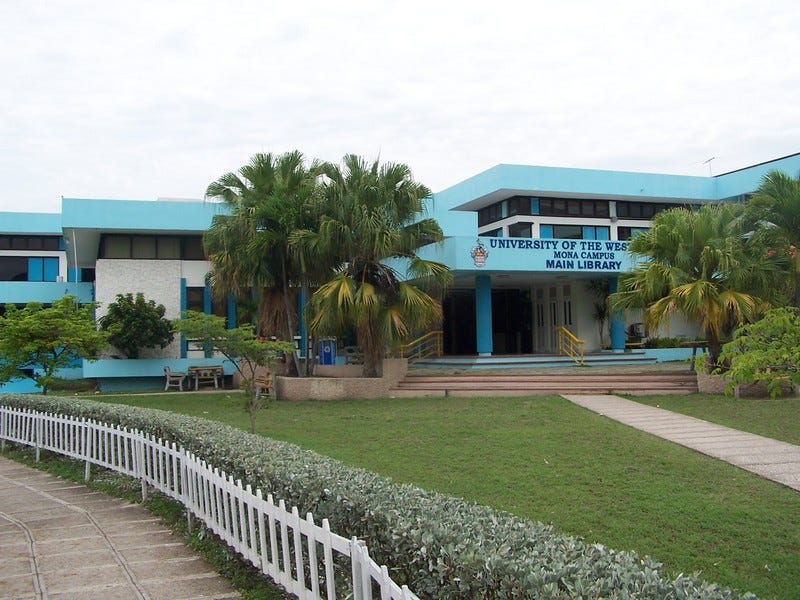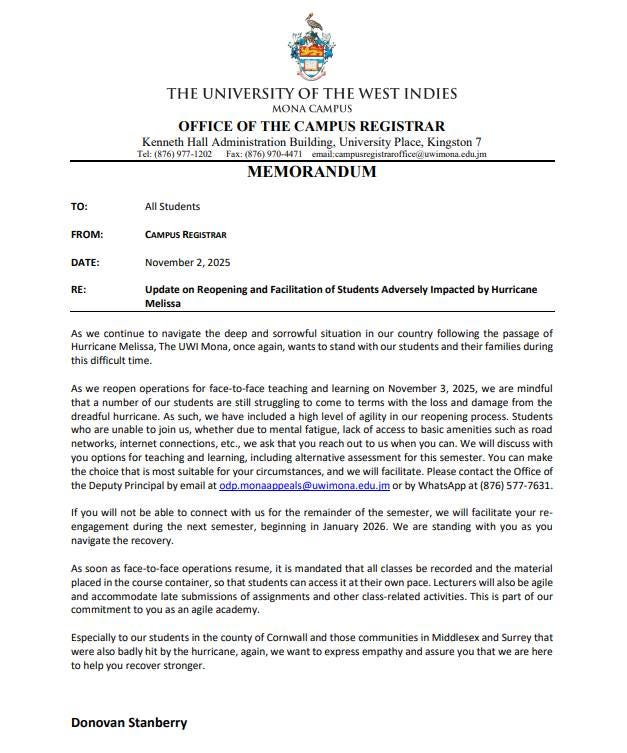Jamaica’s Youth Lead Call for Empathy in Wake of Hurricane Melissa Devastation

Students at the University of the West Indies (UWI), Mona campus, are set to stage a peaceful sit-out on Monday to oppose the university’s decision to resume in-person classes less than a week after Hurricane Melissa devastated Jamaica.
According to reporting by the Jamaica Observer, student leaders have called the administration’s decision “irresponsible” and “tone-deaf,” arguing that it fails to consider the dire circumstances facing much of the student body.
In an open letter released Sunday, the UWI Guild of Students urged the university to suspend academic activity for one week and adopt a hybrid model afterward. The letter highlighted that many students remain displaced, with limited access to electricity, water, and internet services after the Category 5 storm tore across the island.
“The university does not yet have the capacity to identify how many of its students are homeless, injured, or worse,” the statement read, adding that a return to “business as usual” ignores the emotional and physical trauma many are facing.
Students also cited examples from other institutions: the University of Technology (UTech) has indefinitely suspended in-person classes, while UWI’s Western Jamaica Campus delayed reopening by a week. The guild further criticized what it described as a “class issue,” accusing administrators of continuing to charge rent to displaced students.
“Tomorrow, sit out. Resist the insensitivity and impracticality of this decision,” the letter concluded.
As frustration brews on campus, Jamaica’s private sector has ramped up disaster relief efforts nationwide.
The Jamaica Observer reports that Restaurant Associates Limited (RAL), operators of Burger King, Popeyes, Little Caesars, and Krispy Kreme, joined forces withProject STAR to prepare and distribute more than 1,300 meals to residents and first responders in Savanna-la-Mar, Westmoreland, one of the hardest-hit regions.
Former MP Lisa Hanna praised RAL’s actions on Instagram, describing the company as “deeply rooted in Jamaica’s community spirit.”
Restaurants of Jamaica (ROJ), the franchise holder for KFC and Pizza Hut, also announced an $18 million relief initiative, providing meals and financial assistance through the government’s National Disaster Fund and charities such as Food For the Poor and The Salvation Army.
ROJ Managing Director Mark Myers said the company’s response forms “part of a broader commitment to help families and institutions rebuild what has been lost.”
“Jamaica is our home,” Myers added. “We are deeply committed to helping our people rise again.”
Across Westmoreland Parish, helicopters from the Jamaica Defence Force (JDF) and World Central Kitchen supplied emergency food and relief supplies on Sunday.
As The Associated Press reported, the aircraft landed at Belmont Academy, where hundreds of residents gathered for flour, rice, sugar and canned goods. Despite the aid, access to safe drinking water remains a major challenge after widespread pipe damage.
“Many people here don’t have anywhere to live,” said Keisha Rowe, a teacher at the school. “We’re grateful the help came fast.”
For others, the assistance provided emotional relief amid devastation.
“You can get back a roof, but not a life,” said Wayne Smith, a visually impaired resident who lost his home, told the news publication.
In rural Jamaica, farmers and fishers are grappling with extensive losses.
The storm’s 185 mph (298 kph) winds destroyed boats, crops and greenhouses across St Elizabeth and Westmoreland. A major poultry operation that produced 75,000 eggs per day was utterly destroyed, and thousands of chickens perished.
Agriculture Minister Floyd Green told Reuters that the damage is “widespread and historic” and that recovery “will take months, if not years.”
Fisherman Prince Davis from White House, Westmoreland, said his two boats and family home were lost: “It’s going to be rough. With the damage now, no one will be buying products.”
Similarly, farmer Denver Thorpe told the AP News that he lost acres of crops just before the Christmas harvest. “There’s absolutely nothing. We were just about turning the corner after Beryl.”
Government agencies and NGOs are prioritizing emergency food, shelter and medical aid before moving to reconstruction.
According to a statement from the World Bank Group, Jamaica will receive financial and technical support for a Rapid Post-Disaster Needs Assessment and may access up to $140 million through its Catastrophe Deferred Drawdown Option, a line of credit for climate emergencies. El Salvador’s President Nayib Bukele dispatched three humanitarian aid planes to the island to support recovery efforts, while the UK government announced plans to mobilize £7.5 million (approximately $9.85 million) in additional emergency humanitarian. The UK initially pledged just £2.5 million (roughly $3.3 million) to the island, which, to this day, remains part of the British Commonwealth, sparking public outrage. Days later, they promised further on top of the £5 million announced earlier that week.
Canada has also pledged $5 million to the region.
“My heart goes out to everyone affected during these difficult times. Canada’s initial response is focused on addressing the most immediate and urgent needs in the Caribbean region. We will continue to explore additional ways to support those impacted,” said Randeep Sarai, Secretary of State (International Development).
“People in Jamaica affected by Hurricane Melissa have a long road ahead to recover and rebuild stronger,” Loyce Pace, International Federation of Red Cross and Red Crescent Societies (IFRC) Regional Director for the Americas, said in a statement.
“This contribution will help the IFRC and the Jamaica Red Cross provide critical support along that journey — from restoring homes and livelihoods to preparing for future hurricanes. We’re deeply grateful for this support, which keeps people’s recovery and resilience at the heart of humanitarian action.”
Still, for many Jamaicans, the recovery is as much emotional as it is physical. “My worry is about when the economy will be back to normal,” said Davis, the fisherman. “Everyone is picking up the pieces.”





